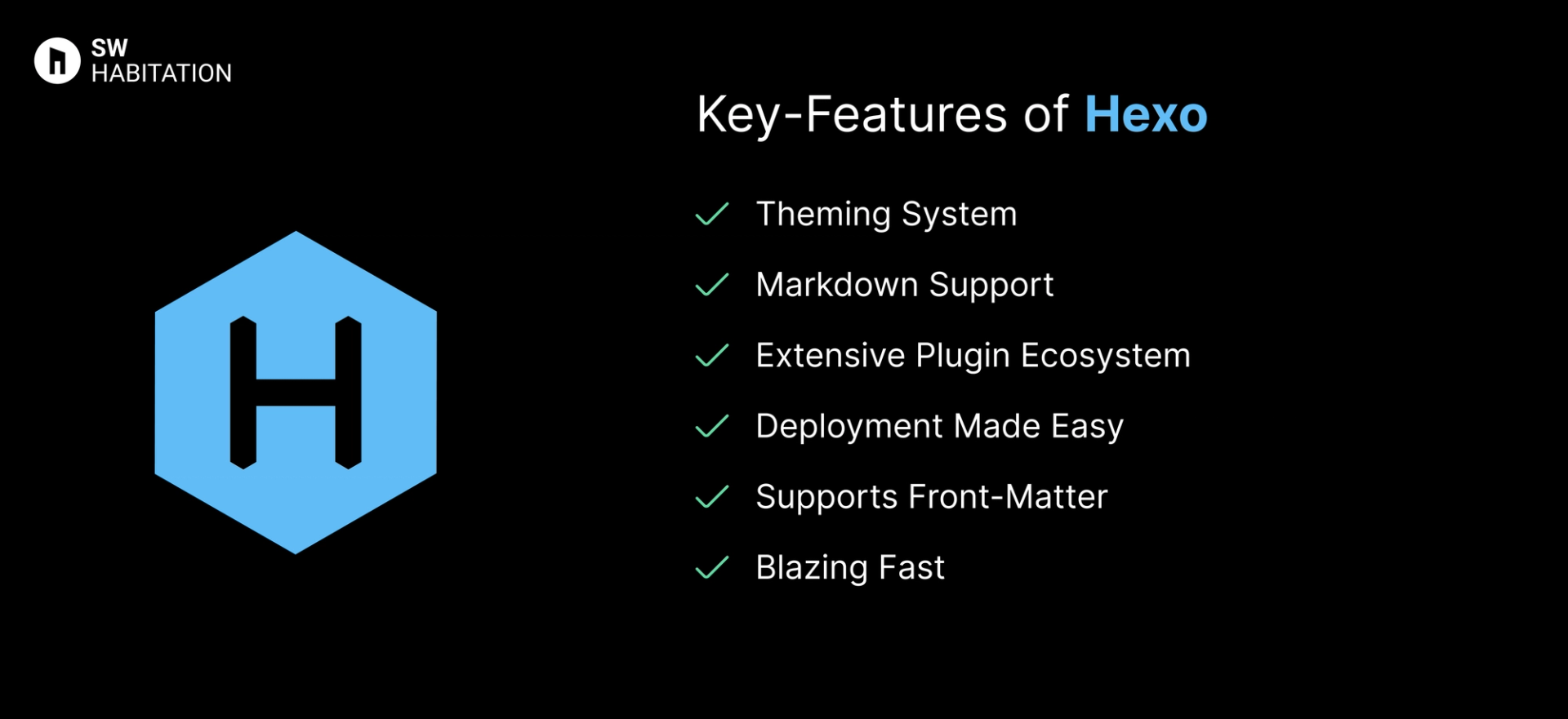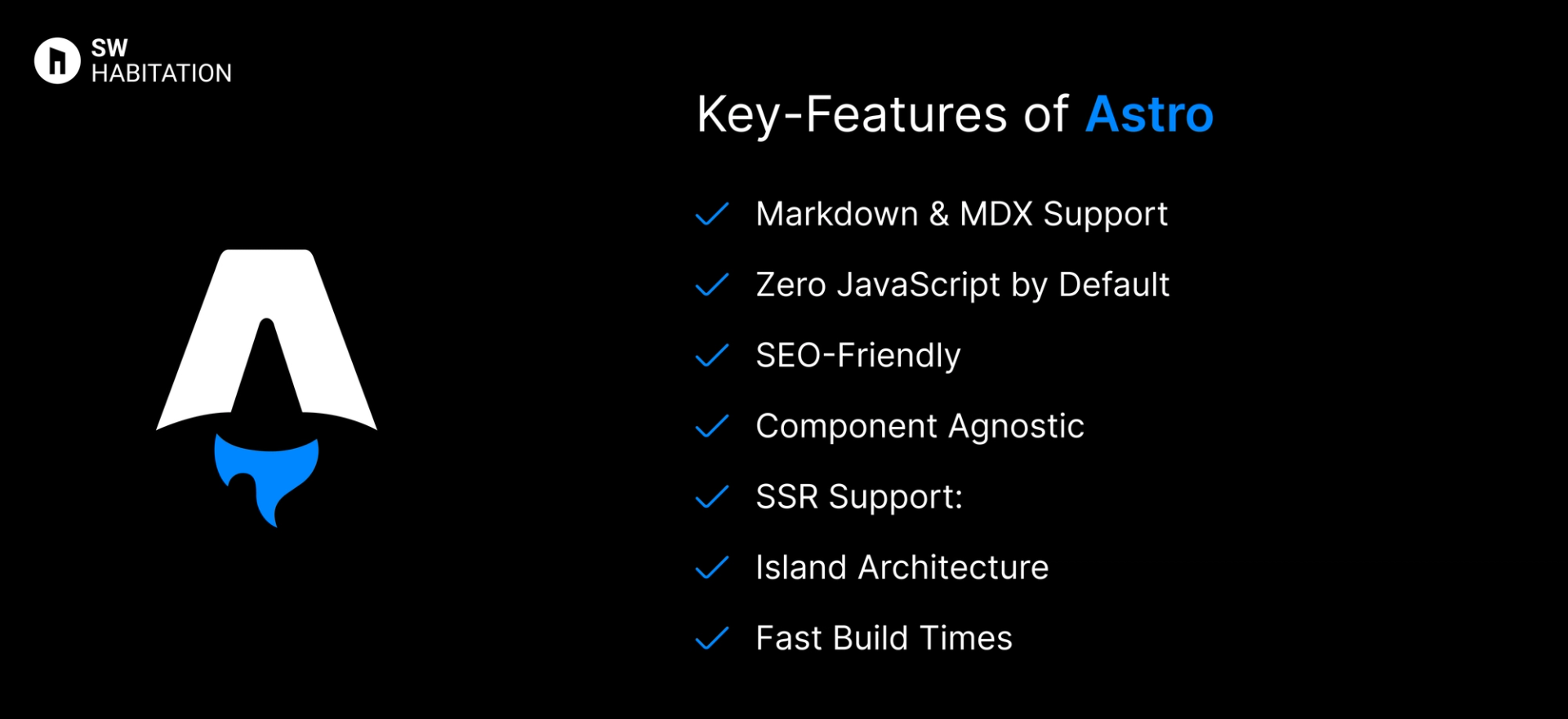Hexo vs. Astro

Hexo

Astro
Have you ever been to a website that loads super fast? Chances are it uses an SSG (Static Site Generator). It’s a tool that builds your site ahead of time, so when someone visits, they get the page instantly. No waiting around for things to load it’s just there.
What is Hexo?
Hexo is a Node.js powered static site generator that transforms Markdown files into static HTML pages. It’s particularly popular among bloggers and developers who love the simplicity of Markdown but also want a bit more control over the final website output as well.
Key Features of Hexo


- Theming System: Supports customizable themes for a personalized look.
- Markdown Support: Write your content in Markdown and let Hexo handle the rest.
- Extensive Plugin Ecosystem: Offers a range of plugins for SEO, analytics, and more.
- Deployment Made Easy: One-command deployment to platforms like GitHub Pages or Vercel.
- Supports Front-Matter: Add metadata like titles, tags, and categories to each post.
- Blazing Fast: Generates static files in seconds, even for large websites.
Advantages of Hexo
- Huge Plugin Library: Extend functionality effortlessly.
- Perfect for Blogs: Tailored to bloggers who want to focus on content.
- Minimal Setup: Simple installation and configuration.
- Speed: Lightning-fast build times.
- Markdown Focused: Keeps writing pure and distraction-free.
Disadvantages of Hexo
- Less Modern Than Some Alternatives: Lacks the modern features of frameworks like Next.js or Gatsby.
- Limited Dynamic Content: Not ideal for highly interactive sites.
- Node.js Required: Needs Node.js installed.
What is Astro?
Astro is a modern Static Site Generator that focuses on delivering faster websites by sending as little javaScript as possible.
Unlike traditional javaScript frameworks, Astro renders pages at build time, creating static HTML that gets served directly to users.
One of its standout features is the island architecture, which lets you selectively hydrate only the parts of the page that need interactivity means you only load javaScript when it’s absolutely necessary.
Key Features of Astro


- Markdown & MDX Support: Write content with ease using Markdown or MDX.
- Zero JavaScript by Default: No javaScript is sends to the client unless absolutely needed.
- SEO-Friendly: Built-in optimisations like automatic sitemap generation.
- Component Agnostic: Supports React, Vue, Svelte, and more — all in the same project!
- SSR Support: Optional server-side rendering if needed.
- Island Architecture: Load JavaScript only for interactive components.
- Fast Build Times: Optimised for super-fast builds, even for large websites.
Advantages of Astro
- Great for Content-Driven Sites: Perfect for blogs, documentation, and portfolios.
- Developer-Friendly: Clean syntax and great tooling make development a breeze.
- Minimal Setup: Simple config with automatic optimisations.
- Flexible and Versatile: Use multiple frameworks in one project.
- Blazing Fast Performance: Less javaScript means faster load times.
Disadvantages of Astro
- Limited Dynamic Content: Out of the box, it’s more static-focused. Dynamic content needs extra handling.
- Newer Ecosystem: Fewer plugins and community resources compared to older SSGs.
- Learning Curve: Island architecture might take some time to get used to.
Comparison Between Hexo vs Astro
Use Cases of Hexo
- Fast Deployments: Get your site online with a single command.
- Technical Documentation: Write clean, organized docs quickly.
- Blogging: Built with bloggers in mind, especially those who love Markdown.
- Developer Portfolios: Show off projects with minimal effort.
Use Cases of Astro
- SEO-Focused Projects: Ships with built-in SEO optimisations.
- Content-Heavy Sites: Blogs, marketing sites, and documentation hubs.
- Multi-Framework Projects: Mix and match React, Vue, and Svelte in one codebase.
- Developers Seeking Speed: Fast build times and minimal runtime JavaScript.
Conclusion
Static Site Generators are a big game changer if you’re looking to build a website that’s fast, secure, and easy to maintain. Whether you’re launching a personal blog, portfolio, or a business website, they give you the freedom to focus on what really matters, your content and your users without all the extra complexity.
The best part? You’re not locked into one way of doing things. You can choose the tools and tech you’re most comfortable with, and scale things up as your site grows. From lightning-fast load times to better SEO and easy hosting, SSGs make the whole process smoother.
At the end of the day, it comes down to what fits your workflow and goals best. Pick the one that feels right to your requirements, and you’ll be well on your way to creating a beautiful, high-performing website that you’re proud of 🙌
Frequently asked questions
What’s Hexo good for?
Hexo is good for building fast blogs and simple static websites that need to be quickly set up and easily managed.
Is Hexo easy to set up?
Yup, Hexo has a straightforward setup process and is easy to get running with minimal configuration.
Does Hexo use Markdown?
Yup, Hexo uses Markdown files to create content, so it's developer-friendly and easy for content creators to manage.
Does Hexo support plugins?
Yup, Hexo has lots of plugins available to extend its functionality, whether it’s for SEO, performance, or content management.
Is Astro great for blogs and docs?
With support for Markdown and MDX, Astro is a fantastic choice for documentation sites, blogs, and other content-heavy websites
Does Astro support SSR?
Yes, You can use Server-Side Rendering (SSR) for dynamic content, or stick to static generation for blazing fast websites. Astro provides flexibility to choose the best approach.
Can I use React or Vue with Astro?
Yes, Astro supports React, Vue, Svelte, and many other frontend frameworks. You can even mix and match them on the same page.
Why is Astro so fast?
Astro uses HTML-first rendering, so it ships static HTML by default and only hydrates interactive components when necessary, leading to blazing fast performance.
